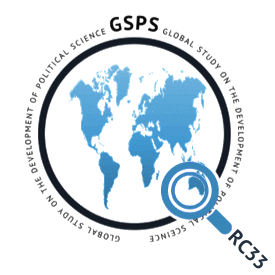For those who could not attend the Seoul business meeting of our RC, please find below a brief summary of its outcomes (this message was also sent via email to the RC33 members in July 2025):
1. RC coordination
Officers (2025-2029)
Chair: Luciana Alexandra GHICA, University of Bucharest, Romania, luciana.ghica@unibuc.
Secretary: Victor ALARCON OLGUIN, Universidad Autónoma Metropolitana-Iztapalapa, Mexico, victor630215@aol.com
Members of the advisory board
Robert ADCOCK, American University Washington, United States
Nick DORZWEILER, Wheaton College, Unites States
John FENG, Wuhan University, China
Emily HAUPTMANN, Western Michigan University, United States
Fiona MACDONALD, University of British Columbia, Canada
Shaimaa MOHEYELDIN, Cairo University, Egypt
Jan Robert R GO, University of the Philippines Diliman, Philippines
Paulo RAVECCA, Saint Mary's University, Canada (outgoing president)
Noor SUWWAN, University of Chicago, United States
Jarosław SZCZEPANSKI, University of Warsaw, Poland
We thank our outgoing president - Paulo RAVECCA, under whose leadership our RC had the largest presence in its history at an IPSA world congress (in Buenos Aires, 2023). We are grateful that he will continue as member of the board and we count on his ongoing support and input for the organization of the next congresses and of other activities within RC33.
We also thank the outgoing board members (Thibaud BONCOURT, Matthew FLINDERS, Hamdy HASSAN, Marcela SCHENCK), whom we congratulate for their current projects and positions that no longer allow them to contribute to the activities of the advisory board. We are glad that we can continue to count them among our RC's members and we also hope that in the next four years they will be able to attend at least one of the next congresses and some of the additional planned events.
2. Upcoming activities
Our RC was recognized as a study group in 1982 and granted research committee status in 1989. This means that the next two IPSA world congresses - in Rome (2027) and TBD (2029) - will mark important anniversaries for our RC, i.e. 45 years since establishment (in 2027) and 40 years since becoming an RC (in 2029). We aim to have a large presence of our RC in both these congresses and to prepare for/from these events also several publications. During the Seoul congress we initiated contact with several publishing houses and we will announce more details as soon as we have more substantial news on the matter of potential publications.
To continue to be recognized as an RC we need to organize at least two panels during each world congress and at least one event between two consecutive world congresses.
Since 2014, our RC had a regular section at the international interdisciplinary conference of political research SCOPE: Science of Politics organized by the University of Bucharest (Romania) and will continue to do so for SCOPE's 10th anniversary (Bucharest, 2026), which also coincides with the 35th anniversary of this university's Faculty of Political Science, as well as with a new initiative of the SCOPE organizers - Bucharest International Gastro-Diplomacy (BIG-D) Fest. A call for applications will be launched soon and announced in the next newsletter.
After the pandemic, our RC also organized an online workshop on methodological issues relevant for the study of political science as a discipline, with a focus on the study of political scientists (an initiative of our colleague Mehtap Söyler). We also co-organized an event on the state of political science in 2023, right before the IPSA World Congress in Buenos Aires, with the support of colleagues from several universities from Latin America and the US. In the upcoming years we hope to multiply and diversify such activities, in addition to the already traditional SCOPE presence.
Following the upcoming board meeting (tentatively planned in September), we hope to also advance with more long-term activities. In this respect, in addition to the publications mentioned above, the main priorities for 2025-2029 will be
- the database of publications relevant for the study of political science as a discipline (an update of a previous initiative of our colleagues Bob Reinalda and the late Thierry Dias Coelho); currently this is in the final testing phase of the digital platform which will host it (technical support provided by the University of Bucharest)
- a global survey on the state of political science as discipline and profession (an initiative of Luciana Alexandra Ghica); currently in the methodological drafting phase, with updates focused on items related to academic freedom and economic/political pressures on political science departments and political scientists, especially following the recent increase in attacks on university and academics worldwide, including in countries usually labelled as democratic
More details about these, as well as calls for input and support from all RC members will be announced through newsletters.
As usual, we will continue to kindly ask you to send us the details of recent publications (by you or other colleagues) which may be relevant for the scope of RC33 so that we include them in the database and announce them in the newsletters.



